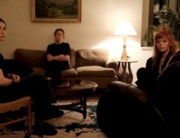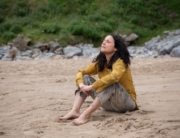
If The County’s plain-spoken title reminds anyone of the 1984 film Country from 1982, starring Jessica Lange trying to save the family farm, then perhaps it’s intentional.
Director Grímur Hákonarson returns to the wintry rocky Icelandic countryside for his sophomore feature film. It was also the setting for Rams, an empathetic parable of brotherly-animosity-turned-love. Again, he centers his economically told, compact plot on his actors and their unspoken moments (with a lot of pensive close-ups of his protagonist smoking), and it’s as straightforward. Yet his new film bubbles with tension: Is it a thriller or a Capra-esque tale of the little guy fighting against the Man? It’s a little of both and yet neither. The director has it both ways while letting his lead actress, Arndís Hrönn Egilsdótti, take the wheel. (Imagine a Frances McDormand with the minimum of mannerisms and more stoic.)
Though the drama begins with the graphic birth of a calf and that could help viewers earn a 4-H badge, the film is less about farming and more about righting wrongs. After the death of her husband, Reynir (Hinrik Ólafsson), fifty-something Inge learns from the police that his death may not have been accidental. There were no skid marks on the road where his truck dived into a canyon, and his brakes were working, so the police assume suicide as the cause of death. She already knows she and her husband are heavily in debt to the all-controlling county co-op, which buys all of the milk that the local dairy farmers produce and supplies all their needs and expensive equipment. Those who take advantage of lower prices elsewhere face retaliation. (According to the press notes, this organization still exists.)
What Inge doesn’t know is a secret the viewer is privy to from the beginning: her husband has been an informant for the co-op. Founded more than a 130 years ago as a democratic institution, it has turned into an autocratic organization that has strangled the options of this agricultural community in northwest Iceland. Yet Inge dares to speak out, posting a Facebook article comparing the co-op to the Mafia. The result: snarky comments, vandalism, and more to follow.
The film takes a stand for the common man, or in this case a middle-aged, emerging activist, without a galvanizing, crowd-pleasing Norma Rae moment. It’s much too subdued for that. One sequence of vengeance in particular may remind viewers of Three Billboards Outside of Ebbing, Missouri, though without the grandstanding or sanctimony. Instead, slow and steady wins the day here. Unlike some of the aforementioned films, this one quietly reminds viewers that you win some, you lose some. The subdued ending is in keeping with its buttoned-down, pragmatic world view.






Leave A Comment